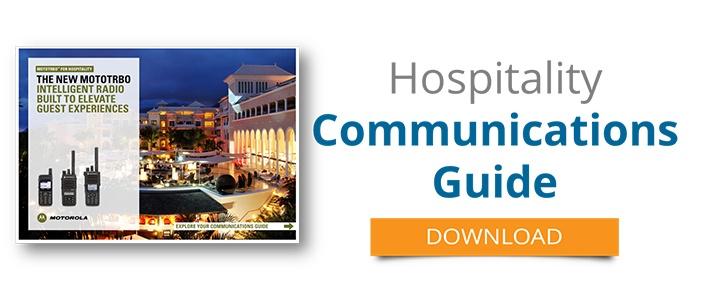
Guests expect it, federal law requires it, and protecting guest confidentiality is critical for building trust and avoiding negligence claims. Hotels that prioritize data security and privacy also build trust, enhance their reputation, and create loyal customers.
With technology playing an increasingly central role in hospitality operations, guest confidentiality now extends beyond room privacy to safeguarding personal data, securing communications, and preventing unauthorized access.
Here’s why hotel guest confidentiality matters and how modern communication technology can help you make it happen.
What Exactly Is Hotel Guest Confidentiality?
Hotel guest confidentiality is about protecting sensitive guest information and ensuring their privacy throughout their stay. This includes:
-
Identifying Information: Safeguarding personal details like names, contact information, and payment data.
-
Room Security: Restricting room access to authorized individuals through secure key card systems or digital locks.
-
Data Protection: Securing reservation systems and networks to prevent breaches.
-
Guest Interactions: Protecting conversations and exchanges involving staff and guests.
From securing WiFi connections to using two-way radios for private staff communication, confidentiality requires a comprehensive approach to protect guests and elevate their experience.
How Communication Technology Can Help
Modern communication technology provides hospitality teams with tools to safeguard guest confidentiality, enhance operations, and create a more secure environment.
1. Secure WiFi Networks
WiFi is no longer a luxury for guests—it’s a necessity. According to a survey reported in Hospitality Technology, more than 90% of guests consider WiFi access “very important,” and 58% say its availability influences their booking decisions. But with connectivity comes risk. Unsecured networks can expose guests to hackers, putting their sensitive data at risk.
What to Do:
-
Use encryption protocols to secure guest connections and protect transmitted data.
-
Invest in wireless equipment that proactively detects and blocks unauthorized access.
-
Regularly audit and update your WiFi infrastructure to stay ahead of potential threats.
Learn more about solving poor in-building wireless connectivity.
2. Video Surveillance for Guest Protection
Video surveillance does more than monitor hotel premises—it provides guests with peace of mind by enhancing safety and deterring theft or fraud. Strategically placed cameras can:
-
Monitor Sensitive Areas: Protect guest check-in stations and credit card transactions.
-
Control Access: Ensure only authorized individuals are present in hallways, lobbies, and other key areas.
-
Provide Oversight in Shared Spaces: Pools, gyms, and restaurants can benefit from surveillance, protecting unattended belongings and deterring unauthorized activity.
Modern video systems with AI analytics can automatically detect unusual behavior, reducing manual monitoring while improving efficiency.
Explore how smart data analytics are transforming video surveillance.
3. Two-Way Radios for Secure Staff Communication
Staff communication often involves sensitive guest information, and two-way radios provide a secure, efficient way for teams to communicate:
-
Immediate Connections: Push-to-talk capabilities enable real-time responses to guest needs.
-
Dedicated Frequencies: Radios operate on secure frequencies, ensuring private communication.
-
Expanded Coverage: Unlike cell phones, radios work reliably on large properties or in areas with poor coverage, such as mountainous or waterfront locations.
Key personnel, including front desk, housekeeping, and security teams, can collaborate seamlessly to enhance both guest satisfaction and confidentiality.
Discover the types and uses of two-way radio systems.
Why Confidentiality Will Always Be Critical
As technology evolves, so do the risks to guest privacy. From increasingly sophisticated hackers to the rise of connected devices, ensuring guest confidentiality requires ongoing diligence. Hotels must:
-
Evaluate and Upgrade communication systems regularly to stay compliant and secure.
-
Train Staff on privacy best practices and proper handling of sensitive information.
-
Partner with Experts to implement the latest technology for safeguarding guest data and improving operations.
Partnering for Better Hospitality Technology
At Chicago Communications, we specialize in helping hospitality professionals enhance their operations while safeguarding guest confidentiality. Whether you’re looking to secure your WiFi network, upgrade communication tools, or implement advanced surveillance systems, we’ll provide the customized solutions you need to protect your guests and build trust.
Ready to elevate your technology and protect what matters most? Contact us today for a free consultation and see how we can support your goals.


